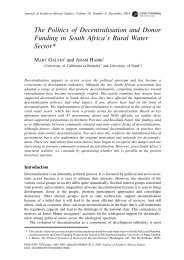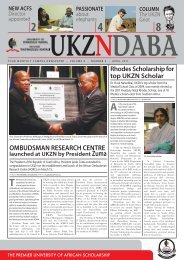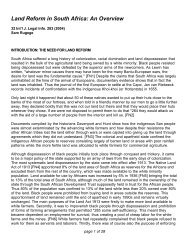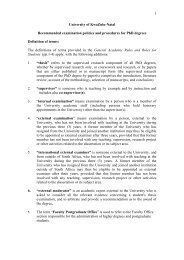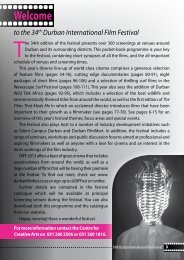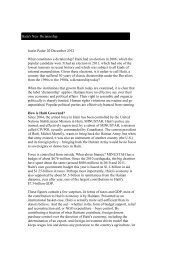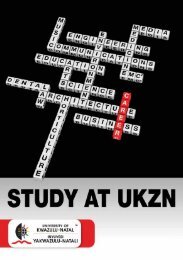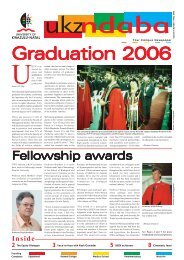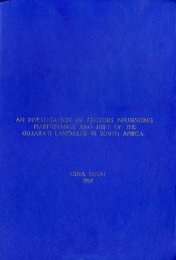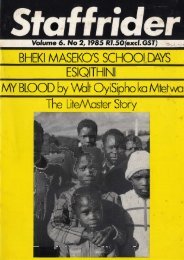Staffrider Vol.3 No.4 Dec-Jan 1980 - DISA
Staffrider Vol.3 No.4 Dec-Jan 1980 - DISA
Staffrider Vol.3 No.4 Dec-Jan 1980 - DISA
Create successful ePaper yourself
Turn your PDF publications into a flip-book with our unique Google optimized e-Paper software.
There's only music, brother,And it's music we're going to singWhere the rainbow ends.Stephen Smith's poetry (and the rest of the poems inBlack Voices Shout) is meant to arouse his fellow blacks tomore positive action, not necessarily to a violent uprising ashis detractors are inclined to think. He is, like most of theemerging black poets, an inward-looking poet who addresseshimself primarily to his fellow blacks:You buyStupidBlack Power StickersWhich you thinkwill bring aboutA changeA change of whatI don't knowYou greet each otherScreaming 'Power'which you labelThe Black TraditionBut you sit on your arsesAccepting the whiteSlave-trader actI tell you brotherYou 're a fool.POLITICS OF RECONSTRUCTIONThis is the kind of literature that's commonest in independentAfrica; it is an area in which the West Africans excel.The purpose of the literature in this category is reconstruction.The writers who undertake such a task mean to serveas the consciences of their respective peoples. They're usuallyunsparing in their criticism of their own political institutions.Such are the writings of Armah, Achebe, Aluko and Okara inWest Africa; Rubadiri and Serumaga in East Africa.Ayi Kwei Armah's The Beautiful Ones Are Not Yet Bornis a scathing attack on the black political opportunists who,while they live in very great comfort, make everybody else'slife miserable. The novel explains the disillusionment amongGhanaians which led to Nkrumah's coup. One need onlycomment on what is perhaps the novel's most misunderstoodfeature, to bring out Armah's technique as well as hisstrength. The novel abounds with images of putrefaction,excreta and vomit as well as with the expletives of the type —'Your mother's rotten cunt.' The technique brings out in nouncertain terms Armah's disgust with the System. Thecorruption, the living conditions and the general decadenceall around him are abominable. The language is fittinglyshocking, suitable, that is, to the subject.His other novels, Fragments (also an attack on corruptpoliticians) and Why are we so Blest? (about a young Africanintellectual's problems) are written in an equally erudite stylewhich reminds one very much of Soyinka.Though Achebe's technique differs from Armah's, hisnovel, A Man of the People, has the same theme as TheBeautiful Ones Are Not Yet Born. The unprincipled, opportunisticpolitician, Komsoon, in Armah's novel is ChiefNanga's counterpart in A Man of the People; the protagonistsof both novels are alike in their opposition to corruption andin their impotent rage. Both novels culminate in the overthrowof the detestable regimes.David Rubadiri's novel, No Bride Price, like Achebe's AMan of the People, also predicts the era of coups and militarytake-overs in East Africa. It is about Lombe's disillusioningexperiences as a civil servant under a corrupt governmentuntil a coup finally topples the government. Rubadiri is alsoa poet whose poetry is concerned with the problem of•All these writers are viewing, asthough through a lens, Africa'smost pressing problems, ^magnifying them for all to see.^adjustment in a continent recently freed from white domination.Another novel which is concerned with the problem ofgovernment in Africa is Timothy Aluko's Chief, the HonourableMinister. Aluko has largely modelled himself afterAchebe, as have most West African novelists. His Kinsmanand Foreman is about corruption and nepotism, likeAchebe's No Longer at Ease. His hero, like Achebe's, mustwithstand the claims of relatives and clansmen for favours.Another novel, One Man One Matchet, deals with the problemof resistance to change among traditionalists.A slightly different novel is Gabriel Okara's The Voice. Inthe novel Okolo seeks to vindicate his integrity — this is themeaning of his search for 'it' — in a world marked bywickedness and corruption. He sees his society's disintegrationas a product of moral degeneracy and materialism. Amost interesting aspect of the book is its language. Okaraattempts to reproduce Ijaw speech inflexions in his English,as when he writes:/ am — I mean — we are soft-hearted people, soft likewater. . . Our insides are soft like water even if you say ourinsides are filled with stone. Our eyes too are soft and theycannot fall on suffering. We have been turning it even in ourinsides since you threw your back at us and left. Our highestson, Abadi, has been telling me an English saying, which Iagree fits you, and that saying is that when I do not see you,you will not be in my inside.Inherent in Okara's writing, especially in his poetry, is alament for the loss of Africa's innocence, expressed in apoem like 'Once Upon A Time'. 'The Call of the River Nun'which won the Nigerian Festival of Arts Award in 1953, is asearch for roots and a glorification of the African past inNegritude fashion.Soyinka's The Interpreters is about a group of disillusionedyoung intellectuals trying to come to terms withan exceedingly exasperating world of corrupt politicians,gross inefficiency, religious charlatans and affected academics(who say 'meral' when they mean 'moral'). The book is oftenspoilt by Soyinka's delight in verbiage. His story may becomplex, his characters may be very sophisticated and profoundthinkers even, but the novel doesn't always benefitfrom the further obscurity imposed on it by the difficultlanguage. Sometimes one is left with the impression that theauthor is merely proving his mastery over English, for whichhe's been highly praised.Robert Serumaga's Return to the Shadows is based on the1966 Ugandan crisis which led to the military confrontationbetween the forces of the Kabaka and Obote's. Serumaga'smessage is that tension in East Africa could easily culminatein bloody rivalry which would mark a return to the 'shadows 1of the Mau Mau.All these are writers viewing, as through a lens, Africa'smost pressing political problems, magnifying them for all tosee. Their purpose, as has been said, is clinical so that byfocussing on these problems they hope that those in authoritywill heed their word and do something to remedy thesituation. Their writings often keep pace with politicalevents, so that a writer like Achebe has written about theearly days of independence, the period immediately leadingto the Nigerian coup and, more recently, in Girls at War, theBiafran war. This makes their work topical and relevant. •44 STAFFRIDER, DECEMBER <strong>1980</strong>/JANUARY 1981




